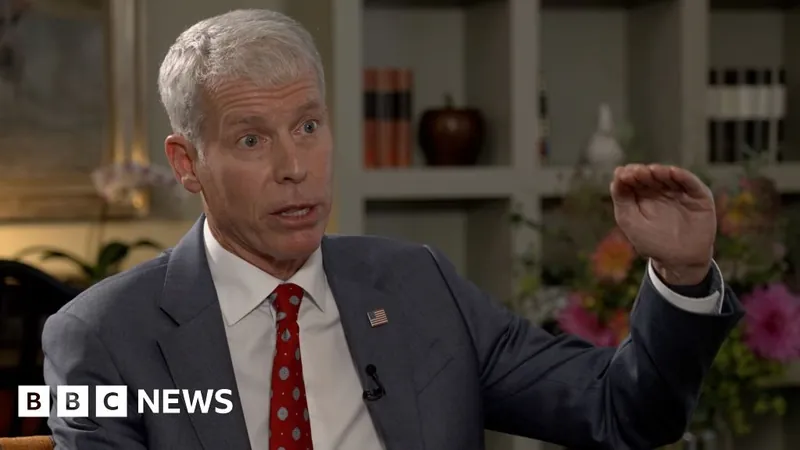
Nuclear Fusion: The Future of Global Energy?
2025-09-11
Author: Charlotte
US Energy Chief Predicts Fusion Power Within a Decade
In a bold statement, US Energy Secretary Chris Wright told the BBC that nuclear fusion—the very power that fuels our sun—could soon be harnessed to energize the world. He confidently asserts that advancements in artificial intelligence and ongoing research could lead to fusion energy entering electricity grids globally in as little as eight to 15 years.
Wright’s predictions come as a surprise, even to fusion enthusiasts, as most scientists believe commercial fusion is still a long shot. However, he insists, "With the innovation happening in national labs and private companies, we could see multiple methods for harnessing fusion within the next five years."
The Complexity of Fusion Energy
Nuclear fusion boasts the potential to generate massive amounts of low-carbon energy without burning fossil fuels. Yet, replicating the fusion process on Earth is no small feat; it requires heating atoms to temperatures significantly higher than those found in the sun itself.
Call for Revived British Fracking and Energy Independence
In the same interview, Wright also called on the UK government to rethink its policies surrounding fracking and new oil and gas licenses in the North Sea. He expressed concerns about Europe's growing dependence on Chinese renewable technologies, suggesting that it could allow them to exert control over European energy systems.
Wright echoed Donald Trump’s claims that the transition to low-carbon energy in the UK and Europe could lead to deindustrialization and hardships for citizens. He argues that embracing fracking could rejuvenate the UK economy, potentially bringing back manufacturing jobs and reducing electricity and heating costs.
Controversy Over Climate Science and Funding Cuts
Citing the Trump Administration's cuts to renewable energy subsidies, Wright defended the notion that the time for government support has passed for wind and solar power, suggesting, "Isn't 25 to 30 years of subsidies enough?" Furthermore, he stood by a contentious report from the Department of Energy that has drawn criticism from over 85 scientists for allegedly misrepresenting climate data.
Acknowledging climate change as a real phenomenon, Wright maintains it will take generations to significantly decarbonize, promoting a dialogue he claims to have sought for years.
Concerns Over the Future of Climate Research
Amidst speculation that budget cuts could undermine crucial climate research, including plans to reduce NOAA funding and the possible closure of key research observatories, Wright dismissed these concerns, asserting the intent is to restore integrity to scientific inquiry rather than stifle it.
He concluded by criticizing the politicization of climate science, claiming that dissenting views often lead to funding cuts, thus stifling innovation and discussion in the field.









 Brasil (PT)
Brasil (PT)
 Canada (EN)
Canada (EN)
 Chile (ES)
Chile (ES)
 Česko (CS)
Česko (CS)
 대한민국 (KO)
대한민국 (KO)
 España (ES)
España (ES)
 France (FR)
France (FR)
 Hong Kong (EN)
Hong Kong (EN)
 Italia (IT)
Italia (IT)
 日本 (JA)
日本 (JA)
 Magyarország (HU)
Magyarország (HU)
 Norge (NO)
Norge (NO)
 Polska (PL)
Polska (PL)
 Schweiz (DE)
Schweiz (DE)
 Singapore (EN)
Singapore (EN)
 Sverige (SV)
Sverige (SV)
 Suomi (FI)
Suomi (FI)
 Türkiye (TR)
Türkiye (TR)
 الإمارات العربية المتحدة (AR)
الإمارات العربية المتحدة (AR)